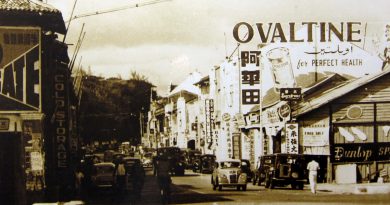MEET MALAYSIA’S SYED SADDIQ, 25, YOUNGEST CABINET MINISTER IN ASIA
You’ll have to get up pretty early if you want to keep up with Malaysia’s Youth and Sports Minister, Syed Saddiq Syed Abdul Rahman: he’s out of bed at 5am every morning, eats breakfast, and goes for a run followed by 50 push-ups and 50 sit-ups. Not the most strenuous of morning callisthenics, granted – but the schedule that follows this early workout is both mentally and physically gruelling.
Fortunately, he has the resilience of youth: at 25, Saddiq is the youngest Cabinet minister in Asia. A member of the Malaysian United Indigenous Party, or Bersatu, Saddiq was chosen for cabinet after shock general election results in May saw the Barisan Nasional coalition toppled after more than 60 years of rule to make way for the Pakatan Harapan alliance. The former government’s lead party, the United Malays National Organisation (Umno), lost many votes to Saddiq’s Bersatu, led by elder statesman and current premier Mahathir Mohamad.
Saddiq, who spent the lead-up to the election working closely with Mahathir, was fielded as a candidate in the constituency of Muar in the state of Johor. Rival politicians mockingly referred to him as a “kitten”, an insult he took in good-natured stride. “Thank you!”, he posted on his Instagram account, which currently boasts 1.5 million followers. “I have always wanted to be a kitten.”
The statement was tongue in cheek, but Saddiq’s affection for cats is just one of the things that marks him as firmly millennial – along with his tech-savvy approach to governance and ability to seamlessly multitask. It’s one thing for a youth minister to promise to champion youth interests, but how many of them have actual skin in the game? Since coming to office, Saddiq’s policy actions have endeared him to those who fall under his portfolio: working to increase public awareness and interest in the Paralympic Games; lowering the voting age from 21 to 18 (“That’s 3.7 million new voters on the roll – so now political parties will have to take young people very seriously,” he states); and championing e-sports as a valid form of competition – something older politicians may hesitate to do. His boyish good looks don’t hurt his popularity, either.
An ordinary day in Saddiq’s ministerial schedule – which runs from Monday to Friday – is packed with events, keynote addresses, sports facility visits, inter-government engagements, and the odd gym visit. On Friday nights, when his peers head out to hip bars or popular restaurants, Saddiq returns to Muar – a two-hour drive from Putrajaya, the nation’s administrative capital – to perform MP duties, doffing his ministerial hat for a more grass roots role.
“My constituency centre is there, and I deal with complaints that have been lodged, I meet with constituents and address a range of problems: from drainage issues to students who need financial assistance for scholarships.
“I also work to find investors and give them a personalised tour of my constituency, show them the potential and beauty of Muar and encourage them to invest in it.”
Saddiq the minister is just as busy as Saddiq the MP. In between his meetings, Saddiq sees a steady stream of government interns and other unannounced guests into his office, all hoping for advice, input, or maybe just a selfie – and he lends them all an ear. His spacious 17th floor office doesn’t feel like the headquarters of a career politician. Decorated with books and framed football jerseys with a PlayStation 4 in pride of place, it feels more like the den of a put-together common-or-garden yuppie.
His many debate trophies punctuate the otherwise bare shelves. “The office was so empty when I moved in and I didn’t know what else to fill the shelves with,” he explains. Saddiq was a decorated debater, having scooped multiple awards at the Asian British Parliamentary Debating Championships and other tournaments.
He notices issues that others older than him may miss, including female representation. Before Pakatan Harapan came to power it promised voters a 30 per cent female cabinet and was subsequently criticised for not sticking to this promise. Saddiq is conscious of representation when organising events or forums, and is not afraid to cross the political divide and approach opposition parties to ensure more women are involved.
He’s also optimistic about the pressures of the job, and whether his age precludes him from doing it well.
“It’s all about public service,” he says. “Public service does not discriminate when it comes to age. I must perform, prove myself to my constituents, to the people, and everything will move forward smoothly. I believe that although this job is a high-pressure one, as long as my heart is in the right place everything will be fine.”
It hasn’t been all positive feedback, of course – he was roundly criticised for his role in the resignation of his openly gay interim press officer, Numan Afifi Saadan, an activist who received threats for his advocacy of LGBTI rights. Detractors accused Saddiq of not standing up for Numan and allowing him to face discrimination for his sexual orientation.
But sometimes the online brickbats appear to stem from envy or resentment, particularly the belief that his close relationship with Mahathir paved the way for a relatively easy political career.
But Mahathir has never been one to give things away; Saddiq has put in the hours for the cause. During the election campaign period, he was Mahathir’s conduit to younger voters. Their relationship is more than professional, though – there is genuine affection when Saddiq shares anecdotes about his mentor.
“I started working for him last year, sometime in August, and I’ve learned so much from him. He’s meticulous, hardworking, tireless – I’m so young, but even I was tired following him around during campaign period. He reads a book a week – usually fiction. And he is so receptive to ideas new to him, like using social media or live-streaming his speeches,” he says.
“At one point I thought Tun Siti Hasmah [Mahathir’s wife] was going to strangle me to death – this was when we were having trouble with inter-state travel as Mahathir was campaigning all around Malaysia, including more rural areas. Travel by road is taxing and time-consuming, so someone rented a helicopter for him. Barisan Nasional then refused to allow the helicopter to land anywhere, so after checking with my aviation and military friends I came up with this – low-cost! – idea of rappelling down with help and equipment of course. He said it was a good idea and was seriously considering it, but then Tun Siti heard about it and I was pretty sure she was going to kill me.”
Perhaps out of a desire to prove himself worthy and his detractors wrong, Saddiq has fully embraced the challenges that come with ministership, which means putting his personal interests aside.
“I like travel, food, island hopping; but I haven’t had much time to do so for a while now. I like to read, my favourite author is Khaled Hosseini. And once a month I try to watch a movie at the cinema, usually only after midnight – but I almost always end up sleeping in the cinema. In a weird way though, it’s kind of therapeutic.”
His love life is just as staid: although Saddiq is a favourite of many young Malaysian women, he admits he is not seeing anyone seriously at present. The deluge of marriage proposals and propositions he receives online, however, can be a little much.
“I can’t even open my DMs on Instagram. Like, I’ve got a few messages that start out with something innocuous, maybe ‘I have a concern’ – so I open the message to read it, and then, you know lah, pictures and I’m like ‘what in the world did I just see’.”
Whatever the public’s feelings for Saddiq, it’s clear he doesn’t take anything for granted. He refuses to commit to an answer on whether his political career will be a meteor or a long-lived star. But that’s to be expected – Saddiq never wanted to be a full-time politician, hoping instead for a career in academia or public policy.
“I love teaching. I lectured before I entered politics full-time. I like to think it’s in my blood as my mom is a teacher, my aunts are all teachers,” he says. “But I started speaking up about politics when some of my students got into trouble for organising a ‘political’ debate – which was just on the Goods and Service Tax, nothing controversial. At the time I was also working with the then-Law Minister Nancy Shukri as well as lecturing, and that was when news of 1MDB broke. I knew what was happening, and I knew that I wouldn’t be able to sleep peacefully if I didn’t speak out against it.”
Public policy was a career path he was serious about – last year, he received a place at Oxford University’s Blavatnik School of Government to complete a masters in public policy, which he turned down because of his political responsibilities. In a public statement, he expressed regret he would not be able to pursue this long-awaited dream – a post that also drew the ire of netizens who felt he was ungrateful for the position he had been given, or just plain showing off. This “damned if you do, damned if you don’t” treatment Saddiq frequently receives accounts for his guarded, almost secretive nature when dealing with the media or those outside his inner circle – but he’s learned to take it in his stride.
“The only incident I had trouble dealing with was when Umno tried to coerce me into jumping party by threatening to release incriminating information about my family – nothing criminal, just very personal and private things. I know I received a lot of flak for how I acted, but it was an incredibly stressful and difficult time. I only decided I would not do what they wanted me to do – disavow Mahathir and the party, and quit politics – the night before the press conference Umno made me call.”
Saddiq’s priority for now is to focus on the next five years: he’s already accomplished the goal of lowering the national voting age, but he has other ducks lined up: “Further empowering youth NGOs, ensuring there are young representatives in every single layer of decision-making in the government as well as corporate sectors, reducing centralisation of power, ensuring that women’s sports teams are as well-funded as men’s teams.”
The ace up Saddiq’s sleeve is his very genuine belief that young people can and should be allowed to make a difference, and his refusal to engage in bipartisan politicking.
“Moving forward, this government is all about rebuilding Malaysia. In order to do this, we must get the best and most talented people on board regardless of their political views and opinions.
Website:


